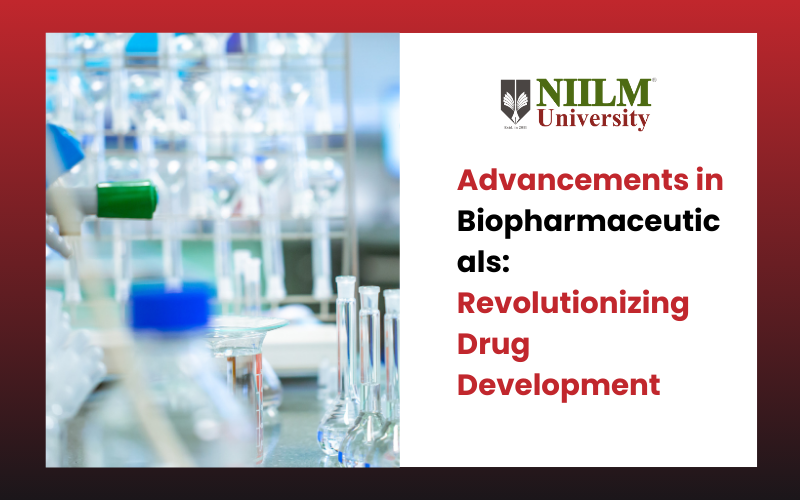Admission Enquiry

Redefining medication development through innovative research that could lead to advances in treatment alternatives and improved health.
In the ever-evolving landscape of modern medicine, biopharmaceuticals have emerged as a revolutionary force in drug development. Unlike traditional chemical-based drugs, biopharmaceuticals are derived from biological sources, such as proteins, antibodies, and nucleic acids, engineered to target specific disease pathways with greater precision and efficacy.
1. Biopharmaceuticals
Biopharmaceuticals, also known as biologics, encompass a broad category of therapeutic agents produced through biological processes. These drugs are pivotal in treating complex diseases like cancer, autoimmune disorders, and genetic conditions, offering patients new hope where conventional treatments fall short.
2. Evolution of Drug Development
Historically, drug development relied on synthesising chemical compounds through trial and error. The advent of biopharmaceuticals marked a paradigm shift by harnessing the power of biotechnology to create drugs that mimic natural substances found in the human body.
3. Key Technologies Driving Advancements
Central to the success of biopharmaceuticals are advancements in genetic engineering and biotechnology. Scientists can manipulate genes to produce therapeutic proteins and antibodies that precisely target disease mechanisms. Coupled with high-throughput screening techniques, researchers can swiftly identify promising drug candidates from vast molecular libraries.
4. Biopharmaceutical Production
The production of biopharmaceuticals involves intricate processes to ensure consistency and efficacy. From cell culture and fermentation to purification and formulation, each step is meticulously controlled to meet stringent regulatory standards and maintain product integrity.
5. Therapeutic Applications
Biopharmaceuticals have revolutionised treatments across various medical domains, including oncology, neurology, and infectious diseases. Case studies abound where biologics have prolonged lives and improved quality of life for patients facing dire prognoses.
6. Challenges in Biopharmaceutical Development
Despite their promise, biopharmaceuticals present challenges such as high production costs, lengthy development timelines, and regulatory complexities. These factors can hinder accessibility and affordability, particularly in resource-limited settings.
7. Future Trends
Looking ahead, the future of biopharmaceuticals is bright with ongoing innovations like personalised medicine and gene therapies. These advancements promise to tailor treatments to individual genetic profiles, maximising efficacy while minimising side effects.
8. Environmental Impact
As the biopharmaceutical industry expands, sustainability practices become paramount. Efforts to reduce carbon footprints and adopt eco-friendly manufacturing processes are gaining traction to mitigate environmental impacts.
9. Ethical Considerations
Ethical dilemmas surrounding biopharmaceuticals include equitable access to treatments, patient consent in genetic research, and transparency in clinical trials. Addressing these concerns is crucial to fostering public trust and ensuring ethical practices in biopharmaceutical development.
10. Global Market Trends
The global biopharmaceutical market continues to grow exponentially, driven by increasing prevalence of chronic diseases and rising healthcare expenditures. Competition among biotech firms and pharmaceutical giants fuels innovation and drives market dynamics.
11. Educational Initiatives
Educational institutions and industry collaborations are essential for nurturing the next generation of pharmaceutical scientists. Training programs and academic partnerships foster innovation and propel the field forward with new discoveries and breakthroughs.
Conclusion
In conclusion, biopharmaceuticals represent a transformative force in modern medicine, offering targeted therapies with unprecedented precision and efficacy. Despite challenges, ongoing innovations and strategic investments promise to expand the therapeutic landscape and improve patient outcomes worldwide.
Copyrights © 2024 NIILM UNIVERSITY. All rights reserved.